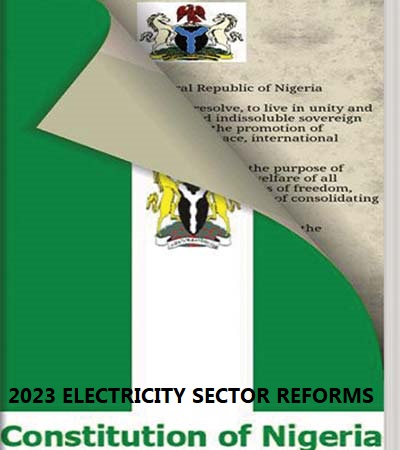2023 CONSTITUTIONAL REFORMS IN THE NIGERIAN ELECTRICITY SECTOR
Since 1999, the Nigerian Constitution has preserved for the National Assembly,
the power to legislate on matters pertaining to electricity generation and
transmission for all parts of the federation. On the other hand, states of the
Federation were only permitted to legislate on matters pertaining to electricity
generation, transmission and distribution in areas not covered by a national
grid system within that state. Hence, electricity generation, transmission and
by default, distribution within the national grid which captures most of the
country’s territory, were activities subject to the exclusive control of the
Federal Government of Nigeria and her designated agencies.
This legal regime meant that States of the federation could only foray into very
unviable and highly remote terrains of their territories which were not
captured by the national grid system and consequently, far away from their
areas of strong economic activity if they wished to take charge in the Nigerian
Electricity Supply Industry (NESI). Otherwise, such states would have to subject
themselves to the regulatory strictures of federal institutions particularly
NERC, charged with the management of the electric power sector. Hence, from
the days of the National Electric Power Authority (NEPA) to the days of the
Power Holding Company of Nigeria (PHCN) and her current successor
companies, down to the present set up which is controlled by the Nigerian
Electricity Regulatory Commission (NERC) and its various licensees, electric
power regulation is almost entirely a federal affair.
However, with the passage and assent to the Fifth Alteration Bill No. 33 to the
1999 Constitution of the Federal Republic of Nigeria (as amended) there is a
seismic shift in the legal milieu which now opens the door of the national grid
system to the States of the federation. Hence, Part II of the Constitution which
contains the Concurrent Legislative List of the Federation particularly Section
14 thereof now permits states to make laws with respect to the generation,
transmission and distribution of electricity within that state. This is irrespective
of whether any such area falls within the national grid system or not.
This constitutional reform has further been backed by law reform following the
passage of the Electricity Act, 2023 which enables State Houses of Assembly in
Section 2(2) thereof to make laws for the generation, transmission, system
operation, distribution, supply and retail of electricity among others within the
state. Hence, the legal doctrine of covering the field is thereby varied to permit
states to make legislation over their domains with respect to electricity
matters. Hence, for the first time in more than 24 years, states of the
federation can take the initiative in reversing the parlous state of electricity
supply in their various territories.
According to Energy Progress Report, 2022, released by Tracking SDG 7, Nigeria
has the lowest access to electricity globally, with 92 million persons out of the
country’s 200 million population lacking access to power. The report produced
in conjunction with International Energy Agency, International Renewable
Energy Agency, United Nations Statistics Division, the World Bank and the
World Health Organisation indicate that Nigeria is in the company of countries
like Democratic Republic of Congo and Pakistan which countries come in at 72
million and 54 million respectively on electricity access deficits.
Distribution Companies (Discos) have been in the blame game business on the
miserable state of power supply in the country, placing the fault at the feet of
the Transmission Company of Nigeria (TCN). While most times a fall in power
generation is blamed by TCN for inadequate load allocation to the Discos, the
frequent collapse of the national grid due to old, inadequate and weak
infrastructure remains a major culprit identified in turn by the Generation
Companies (Gencos). This has occasioned the incidence of stranded power in
the NESI whereby TCN is unable to wheel the available generation capacity of
Gencos. It is on record that since 2015, TCN has been unable to wheel an
average of 30% of the generation capacity of Gencos annually, thereby causing
significant business losses for the Gencos.
Another interesting dimension in the problems bedeviling the NESI, is the weak
regulatory capacity of the Nigerian Bulk Electricity Trading Company (NBET). It
is argued that while TCN continues to allocate load to the various Discos, NBET
has been unable to enforce the remittance obligation of delinquent Discos who
default in their payment obligations to the Gencos for energy supplied. This is
said to induce a liquidity crisis in the Nigerian Electricity Market (NEM) causing
Gencos to default in their credit obligations particularly to gas companies.
There have been proposals that viable Discos should be permitted to purchase
power from Gencos on the basis of “willing buyer and willing seller”without
passing through NBET as is presently required by sector regulations.
According to Professor Kelsey Jack of University of Carlifornia at Santa
Barbara, energy is tightly linked to economic development; there is ultimately
no route to development without greater energy consumption. According to
her, “It is clear that higher levels of GDP are correlated with greater electricity
use, access, reliability and affordability.”Thus investment in energy
infrastructure is critical for achieving radical developmental strides for any part
of the federation. “The ball’can now be said to be “in the court”of State
Governments to take advantage of this paradigm shift in our legal framework.
This is while we anticipate further law reform which will enable states to
cooperate among themselves in electricity trading so as to deepen the gains of
the state of the law on the subject matter.
Okechukwu Ebirim Esq. heads the Electricity Law department at Helig Mor
Attorneys.

